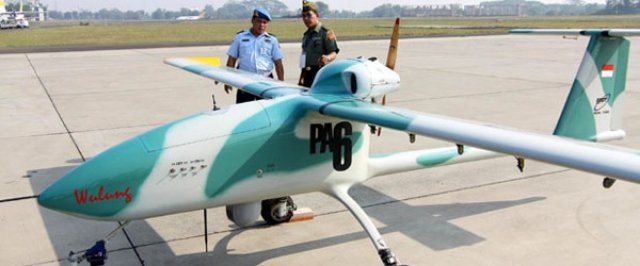 Indonesia has announced that it will begin to mass-produce unmanned surveillance aircraft this year. Analysts say Indonesia’s local UAS development and production is part of a broader trend of rapidly modernizing militaries in the Asia Pacific.
Indonesia has announced that it will begin to mass-produce unmanned surveillance aircraft this year. Analysts say Indonesia’s local UAS development and production is part of a broader trend of rapidly modernizing militaries in the Asia Pacific.
Funded by the Defence Ministry, Indonesia initiated its surveillance UAS development programme in 2004. A collaborative effort between several government agencies, the Wulung, a type of unmanned aircraft system, or UAS, is ready to be mass-produced for the Indonesian Air Force this year.
The Wulung prototype was locally designed and produced, and initially will be used for non-military purposes, such as monitoring active volcanoes, spotting illegal logging and patrolling the country’s huge maritime area.
Covering a wide region
Samudro, a director at Indonesia’s Research and Technology Application Agency that jointly developed the prototype, said the UAS will help Indonesia keep tabs on its 17,000 islands and multiple borders.
“To monitor our borders, to monitor our illegal fishing, to monitor the human trafficking, for example, and also for search and rescue,” said Samudro.
The aircraft will be placed in the country’s vast border regions, with Papua New Guinea and East Timor to the east, and Malaysia and Brunei to the northwest.
While all current UAS are unarmed, the Indonesia Defense Ministry says it has long-term plans for a weaponized model capable of shooting missiles or dropping bombs.
Limited range
The Wulung UAS provides real-time recording to ground control stations, but can only fly for up to four hours and as far as 73 kilometers from its ground controllers.
In trying to match global arms capabilities, Yohannes Sulaiman, an analyst from the Indonesian Defense University, said Indonesia’s local UAS production is counterproductive and ego driven. “It pushes the development back actually years behind other countries. It is all a matter of national ego. It is like the Indonesian way, I guess, proof that we are smart enough to build our own drones,” said Sulaiman.
Most major militaries today operate some form of unarmed UAS, purchased from major suppliers such as Israel and the United States. And with growing economic clout and geopolitical tensions, UAS usage in the Asia Pacific is set to proliferate.
Richard Bitzinger, an ex-CIA analyst and senior fellow at the S. Rajaratnam School of International Studies in Singapore, said drone development in Indonesia is all part of a broader regional trend.
“I mean this is all part of a trend of ratcheting up military capabilities throughout the Asia Pacific. It is just as militaries replace older equipment, the newer equipment is just head and shoulders superior and endowed with new capabilities that these militaries beforehand did not possess,” said Bitzinger. “And so I mean, for me alone, I don’t see UAS alone as some kind of ominous game changer, but what I do see is an overall trend in military modernization, which is increasing the qualitative capabilities of regional militaries.”
China, South Korea, Singapore, and Japan all have UAS programmes underway.
In 2011 the Asia Pacific spent $590 million on UAS, which global consulting firm Frost and Sullivan estimates could rise to $1.4 billion in 2017.
Photo: Wulung
Source:Voice of America
